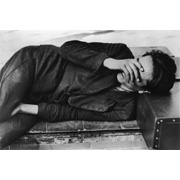| HENRI CARTIER-BRESSON French, b. 1908 |
||
|
A decade after Modotti (pl.
167,187,) emigrated to Mexico with
Edward Weston (related to-->>167,187),
Cartier-Bresson traveled there. In Mexico in 1934, Cartier- Bresson met Alvarez
Bravo and Paul Strand (related to-->>180)
and provided a living example of what Surrealism in photography could be. While
Strand ig- nored Surrealism, Alvarez Bravo embraced it. Cartier-Bresson had been
to Spain, where this photograph was made the year before he went to Mexico. It
shares with Alvarez Bravo's Good Reputation (related to-->>189)
a fascination with the unex- pected: we do not expect to see a person in public
in such a profound and vulner- able state, the left hand tucked between the legs
and the right hand covering the eyes to suggest total emotional and mental withdrawal
from the world around. For Surrealists, photographs were full of meanings that
resulted from the inter- section of unexpected happenings, and the artist's objective
was to stimulate the emotions with the element of surprise. |
